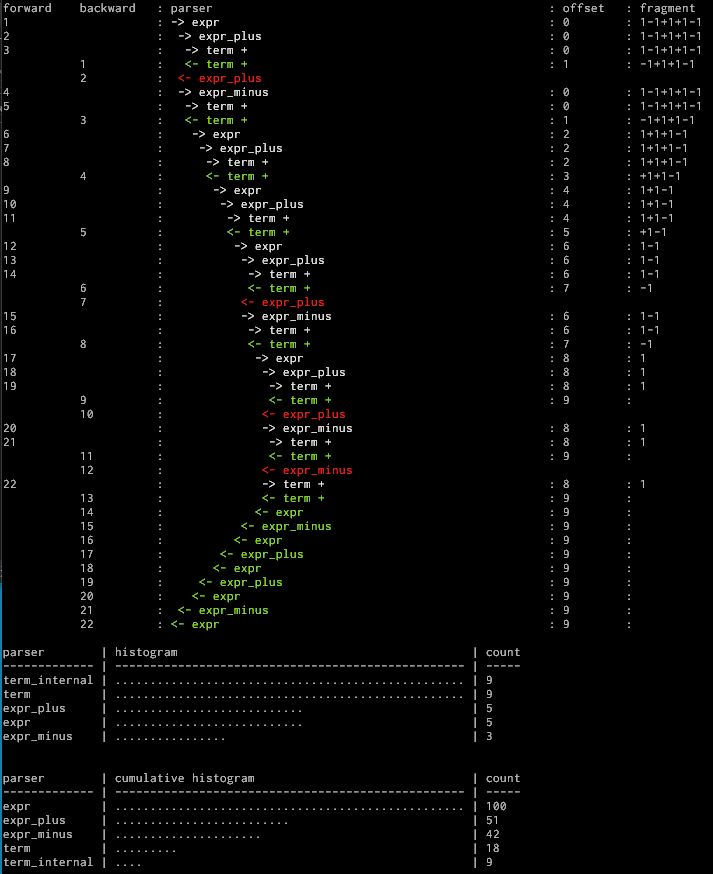16 releases (8 breaking)
| 0.9.1 | Dec 27, 2023 |
|---|---|
| 0.9.0 | Mar 23, 2023 |
| 0.8.0 | Aug 31, 2021 |
| 0.7.0 | Nov 26, 2020 |
| 0.2.1 | Jul 29, 2019 |
#940 in Parser implementations
13,599 downloads per month
Used in 32 crates
(6 directly)
29KB
591 lines
nom-tracable
Extension of nom to trace parser.
Feature
- Tracing parser by colored format
- Forward/backward call count
- Folding the specific parsers
- Histogram/cumulative histogram of parser call count
- Zero-overhead when trace is disabled

Requirement
nom must be 5.0.0 or later. nom-tracable can be applied to function-style parser only.
The input type of nom parser must implement Tracable trait.
Therefore &str and &[u8] can't be used.
You can define a wrapper type of &str or &[u8] and implement Tracable.
nom-tracable is integrated with nom_locate.
You can use nom_locate::LocatedSpan<T, TracableInfo> as input type.
This implements Tracable in this crate.
Note: T in nom_locate::LocatedSpan<T, TracableInfo> must implement FragmentDisplay.
&str and &[u8] implement it in this crate. If you want to use another type as T, you should implement FragmentDisplay for it.
Usage
[features]
default = []
trace = ["nom-tracable/trace"]
[dependencies]
nom-tracable = "0.9.1"
nom-tracable provides trace feature, and the crate using nom-tracable must provide the feature too.
When trace is enabled, trace dump is enabled.
If not, there is no additional cost.
Example
You can try examples by the following command.
$ cargo run --manifest-path=nom-tracable/Cargo.toml --example str_parser --features trace
$ cargo run --manifest-path=nom-tracable/Cargo.toml --example u8_parser --features trace
str_parser is below:
use nom::branch::*;
use nom::character::complete::*;
use nom::IResult;
use nom_locate::LocatedSpan;
use nom_tracable::{cumulative_histogram, histogram, tracable_parser, TracableInfo};
// Input type must implement trait Tracable
// nom_locate::LocatedSpan<T, TracableInfo> implements it.
type Span<'a> = LocatedSpan<&'a str, TracableInfo>;
// Apply tracable_parser by custom attribute
#[tracable_parser]
pub fn expr(s: Span) -> IResult<Span, String> {
alt((expr_plus, expr_minus, term))(s)
}
#[tracable_parser]
pub fn expr_plus(s: Span) -> IResult<Span, String> {
let (s, x) = term(s)?;
let (s, y) = char('+')(s)?;
let (s, z) = expr(s)?;
let ret = format!("{}{}{}", x, y, z);
Ok((s, ret))
}
#[tracable_parser]
pub fn expr_minus(s: Span) -> IResult<Span, String> {
let (s, x) = term(s)?;
let (s, y) = char('-')(s)?;
let (s, z) = expr(s)?;
let ret = format!("{}{}{}", x, y, z);
Ok((s, ret))
}
#[tracable_parser]
pub fn term(s: Span) -> IResult<Span, String> {
let (s, x) = term_internal(s)?;
Ok((s, x))
}
#[tracable_parser]
pub fn term_internal(s: Span) -> IResult<Span, String> {
let (s, x) = char('1')(s)?;
Ok((s, x.to_string()))
}
fn main() {
// Configure trace setting
let info = TracableInfo::new().parser_width(64).fold("term");
let ret = expr(LocatedSpan::new_extra("1-1+1+1-1", info));
// Show histogram
histogram();
cumulative_histogram();
}
License
Licensed under either of
- Apache License, Version 2.0, (LICENSE-APACHE or http://www.apache.org/licenses/LICENSE-2.0)
- MIT license (LICENSE-MIT or http://opensource.org/licenses/MIT)
at your option.
Contribution
Unless you explicitly state otherwise, any contribution intentionally submitted for inclusion in the work by you, as defined in the Apache-2.0 license, shall be dual licensed as above, without any additional terms or conditions.
Dependencies
~2.5MB
~58K SLoC
